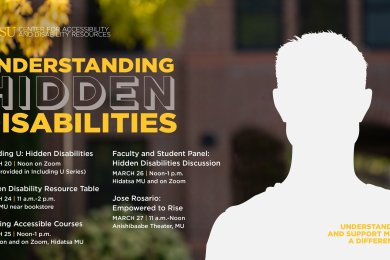
Savannah Lee Smith, a student in NDSU’s Master of Public Health Program, recently submitted a first-hand account of her COVID-19 experience to the blog of the Center for Native American Youth at the Aspen Institute.
Smith, who is a member of the Yucca Fruit Strung Out in a Row Clan of the Navajo people, is from Denver. She is a distance learner who felt an obligation to help the state of North Dakota when the pandemic hit the nation.
Her story, in part, is printed here with permission:
“As we continued our classes over the internet, our studies regarding the impacts of public health in our communities took on a new sense of urgency. Class discussions about infectious disease tracing, health disparities and projected mortality rates were no longer homework exercises as the outbreaks spread like wildfire across our tribal reservations. Some of my classmates who are also health care workers were soon called to the frontlines to treat infected patients, while also trying to balance their class projects and papers.
“By late March, our department announced its partnership with the North Dakota Department of Health to hire students to conduct COVID-19 contact tracing. This involves monitoring the symptoms of individuals who have tested positive and contacting those who have been exposed to the virus and are considered close contacts and requiring them to quarantine. Nineteen students, including myself, quickly responded to the public health call to action. This is what we have been preparing for.
“Even though I participate in the MPH program as a distance learner like many of the other American Indian and Alaska Native students who also work full-time, I felt obligated to contribute to North Dakota’s efforts to aid their community members. In order to quickly transition our classroom knowledge to be applicable to the field, we have received on-going training and daily updates on the complexities of the virus so that we can remain responsive.
“For weeks, we call text or email individuals and their household and close contacts who may feel fine but who we want to encourage to stay home to stop the spread of the disease. We listen to those who are worried about the uncertainty and economic hardships and try to connect them to resources if needed.
“In the next several weeks, another 100 NDSU students will be trained to be contact tracers. North Dakota is currently the only state in the nation that meets the contact tracing capacity need, which is estimated to be 30 contact tracers per 100,000 people.
“Although the number of cases continues to rise, North Dakota has ranked within the bottom 10 of states with the lowest number of confirmed cases, hospitalizations and deaths. This may be due in part to the mass testing events targeting essential workers.
"This is in stark contrast to the reality that the Navajo Nation, my tribe, which has faced some of the highest rates of reported positive cases and deaths per capita in the country. There are only 12 healthcare facilities that serve an area the size of West Virginia. Nearly a third of families need to haul clean water, and this makes basic disease mitigation efforts, such as frequent handwashing nearly impossible. This outbreak has hit us hard.
“Even though COVID-19 has exposed the lack of pandemic preparedness in the U.S., my hope is that the infrastructure of our national and tribal healthcare systems will eventually be strengthened.”
As a student-focused, land-grant, research university, we serve our citizens.



